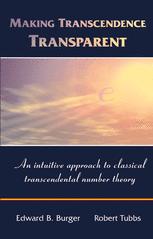

Most ebook files are in PDF format, so you can easily read them using various software such as Foxit Reader or directly on the Google Chrome browser.
Some ebook files are released by publishers in other formats such as .awz, .mobi, .epub, .fb2, etc. You may need to install specific software to read these formats on mobile/PC, such as Calibre.
Please read the tutorial at this link: https://ebookbell.com/faq
We offer FREE conversion to the popular formats you request; however, this may take some time. Therefore, right after payment, please email us, and we will try to provide the service as quickly as possible.
For some exceptional file formats or broken links (if any), please refrain from opening any disputes. Instead, email us first, and we will try to assist within a maximum of 6 hours.
EbookBell Team

4.4
72 reviewsWhile the study of transcendental numbers is a fundamental pursuit within number theory, the general mathematics community is familiar only with its most elementary results. The aim of Making Transcendence Transparent is to introduce readers to the major "classical" results and themes of transcendental number theory and to provide an intuitive framework in which the basic principles and tools of transcendence can be understood. The text includes not just the myriad of technical details requisite for transcendence proofs, but also intuitive overviews of the central ideas of those arguments so that readers can appreciate and enjoy a panoramic view of transcendence. In addition, the text offers a number of excursions into the basic algebraic notions necessary for the journey. Thus the book is designed to appeal not only to interested mathematicians, but also to both graduate students and advanced undergraduates.
Edward Burger is Professor of Mathematics and Chair at Williams College. His research interests are in Diophantine analysis, and he is the author of over forty papers, books, and videos. The Mathematical Association of America has honored Burger on a number of occasions including, most recently, in awarding him the prestigious 2004 Chauvenet Prize.
Robert Tubbs is a Professor at the University of Colorado in Boulder. He has written numerous papers in transcendental number theory. Tubbs has held visiting positions at the Institute for Advanced Study, MSRI, and at Paris VI. He has recently completed a book on the cultural history of mathematical truth.